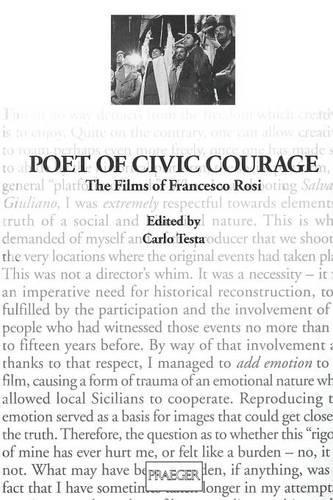
Poet of Civic Courage: The Films of Francesco Rosi
(Paperback)
Publishing Details
Poet of Civic Courage: The Films of Francesco Rosi
Bloomsbury Publishing PLC
Praeger Publishers Inc
25th November 1996
United States
Classifications
General
Non Fiction
791.43
Physical Properties
Paperback
208
Width 156mm, Height 235mm
312g
Description
Rosi's films consistently and directly address the themes of political and institutional corruption and the complex relationship between the individual, the mafia, and the state. Whether evoking the multiple facets of Sicilian banditry in Salvatore Giuliano (1962), exposing right-wing killing squads in Cadaveri eccellenti (Illustrious Corpses) (1976), or courageously debating the roots of Italian terrorism in ^ITre fratelli (Three Brothers)^R (1981), his gripping political-documentary works have managed to combine factual and intellectual rigor with box office success and wide critical acclaim. This book offers a series of essays by leading Italian academics, each exploring a key Rosi film, together with an interview and comprehensive bibliographic and filmographic material. A notable feature is an article by the director himself, in which he reflects on the development and future of Italian political cinema. This book offers a series of essays by leading Italian academics, each exploring a key Rosi film, together with an interview and comprehensive bibliographic and filmographic material. A notable feature is an article by the director himself, in which he reflects on the development and future of Italian political cinema.
Reviews
Seven Italian literature scholars contextualize the undervalued film director....The detailed social background and description provide a valuable reference for scholars.-Choice
"Seven Italian literature scholars contextualize the undervalued film director....The detailed social background and description provide a valuable reference for scholars."-Choice
Author Bio
CARLO TESTA teaches Italian at the University of British Columbia. His work on the European 19th and 20th centuries includes Desire and the Devil: Demonic Contracts in French and European Literature (1991) and a number of articles in English, French, and Spanish, centering on the question of the self, the Utopian issue, and marginality.
